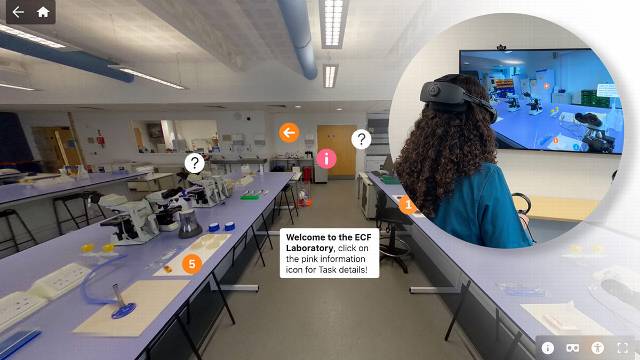Even considering studying an MSc when coming from an arts and humanities background can be a daunting thing. I should know – I’m doing MSc Entomology full time, having graduated with a BA in Journalism 12 years ago.
There are many reasons why someone without a scientific bachelor’s degree might want to get scientific at masters level. Life is fluid; lots can change, and some encounters can have big impacts on how you perceive the world. For me personally, a childhood fascination with insects was reignited while spending time with ecologists working in the unspoilt ecosystems of Prespa National Park in Greece, Albania and North Macedonia.
Actually starting the course is an exercise in managing ‘Impostor Syndrome’ – but once that’s off your back, there’s no stopping you – no matter how atypical an academic shift you’re making. The truth is, there are many transferrable skills that means the distinction between the arts and sciences is not as profound as it is widely assumed.
I’m hardly the only Bachelor of Arts trying to become a Master of Science at Harper. Take Luchia Garcia-Perez, 26, who previously studied English literature and Film Studies at Leicester University from 2012-2015. She is now completing the Agricultural Production Systems MSc – and looking forward to starting work in a field that ideally suits her interests.
“The course is focused on sustainability which I was really excited to study. I didn't think they would allow me on with my BA, but I contacted Heather (Hogan – Postgraduate Office Manager) and she assured me that this would not be held against me and encouraged me to apply. I fortunately got accepted and absolutely love it!”
Luchia has come to her agricultural interests via something of a circuitous route, having grown up on a livestock farm, followed by taking on her bachelor’s degree, spending time in Australia working alongside an agronomist, and working in a job as a Trainee Agronomist. The latter didn’t work out as hoped, as it proved to more of a sales job than one involving actively helping farmers. With her course now in its final stages, she is looking forward to starting more satisfying work.
“It has improved my knowledge and job prospects. I've recently been recruited by ADAS as an agricultural sustainability consultant, beginning in April. Without studying at Harper I don't think I would have got it”, she says.
Charles Griffiths’ first degree was a History BA, but ended up graduating from Harper’s Entomology MSc last year. “Upon graduating my first degree, I did a number of voluntary, ecologically-related work placements aboard in El Salvador, Honduras and Indonesia and in the UK, which reinforced my passion for the natural world, particularly entomology. These experiences and numerous others taught me first hand that the natural world is in somewhat dire straits and I knew that I wanted embark upon a career that helped mitigate against species decline and environmental degradation. I undertook the MSc at Harper Adams for these reasons.”
Charles, 24, now works as Assistant Entomologist for Russell IPM, and aspires to further his career in the area. “As a History graduate undertaking an MSc in ecological sciences, I found the experience challenging. However, thanks to the friendly and helpful staff at Harper Adams and some hard work on my part was able to achieve my MSc with Merit. Overall, I learned several new skills and I made many lifelong friendships with people from all over the world”, he adds.
Of course, MSc is not the only study option available for those looking to branch out or change direction through Level 7 study. Marie Micol, 25, is studying full time for a PgD in Conservation and Forest Protection, whilst working for the National Association for Areas of Outstanding Natural Beauty. Marie, from France, previously worked in corporate finance and then social investments in Germany and then the UK, after gaining a bachelor’s degree in Political Science followed by a masters in International Business.
“What changed for me is that I realised how the natural environment underpins everything that we do in terms of business and policy, and that there is enormous scope for educated professionals to contribute to this sector. However, I obviously needed a better understanding of the scientific aspects of environmental issues, and also needed to re-qualify for better credibility in the workplace. This led me to apply for the PgD”, she explains.
Marie also believes that the scientific style of intellectual enquiry should not be seen as off-putting. “At the start, I was worried I might struggle with the scientific approach and things like reading scientific papers and understanding statistics, but this isn't proving to be an issue so far. A lot of tutors know how to adapt their teaching to a varied, and a scientific and evidence-based approach is rather refreshing compared to the subjectivity of politics. The first module of the course, on Research & Information Skills, was also really helpful for me to adopt the right methods from the start.”
So if you’re thinking that an MSc might be the course of study you’re looking for but concerned about the scale of the challenge, those fears may well be misplaced.
By Gary Hartley
For more information on postgraduate study, get in touch with Heather Hogan, Postgraduate Office Manager, for an informal chat. hhogan@harper-adams.ac.uk
 Blog: Veterinary Medicine students step into immersive 360° laboratory
At Harper & Keele Veterinary School, students are stepping beyond the traditional microbiology bench and into an immersive 360° labo …
Posted
Yesterday
Blog: Veterinary Medicine students step into immersive 360° laboratory
At Harper & Keele Veterinary School, students are stepping beyond the traditional microbiology bench and into an immersive 360° labo …
Posted
Yesterday






